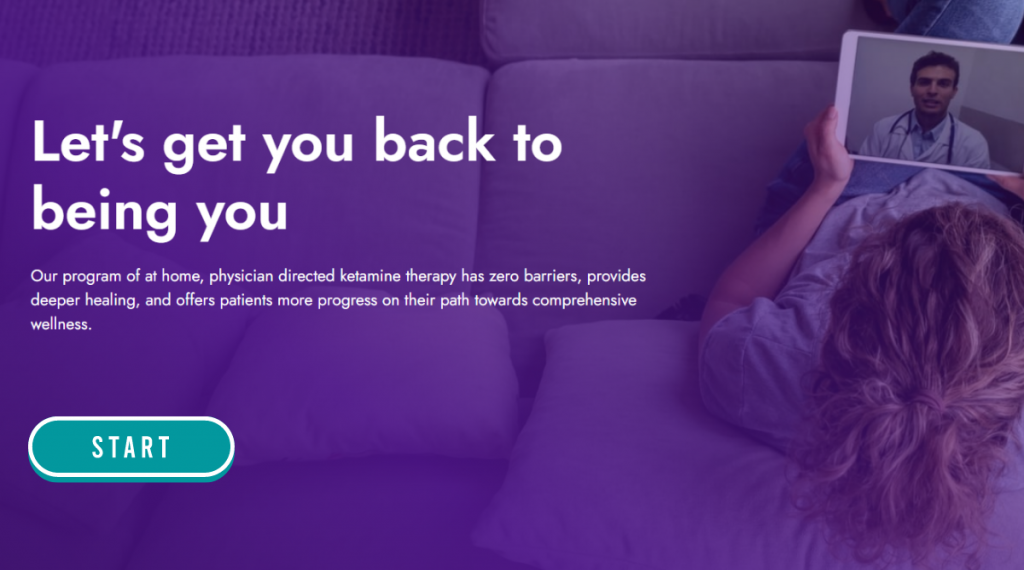
Life with a chronic mental health condition is not easy. But you are not alone. Did you know that more than 51.9 million Americans have been diagnosed with one or more mental health disorders? That is according to the most recent statistics from the National Institute for Mental Health (NIMH). And some patients are looking at ketamine as a new therapy option.
Nearly 1 in every 5 Americans like you are searching for answers and new therapies that can help them manage mental health symptoms. Creating a strategy and treatment plan with your doctor can help you reduce the impact of those symptoms on your daily life.
People who struggle with a mental health disorder receive a conventional approach to therapy that hasn’t changed much in the past century. It is a combination of prescription medications and sometimes psychotherapy. But talk-therapies are not successful if the underlying cause of the symptoms is not addressed. And that’s why so many Americans feel they aren’t getting the help or results they need.
Ketamine is a clinical-grade pharmaceutical that offers a new horizon of treatment for patients—specifically, people who haven’t had much success with conventional treatments like antidepressants and other medications. The U.S. federal government has recently legalized ketamine for off-label use in mental health treatments.
Before you talk to your doctor about Ketamine therapies, learn more about the drug, recent clinical studies, and some of the results that patients have achieved. TripSitter.Clinic shares some of the most frequently asked questions (FAQs) about ketamine treatments for mental health disorders.
The federal government has legalized it for clinical or pharmaceutical off-label therapeutic use. For more than fifty years, Ketamine was used as a general anesthetic for surgical procedures. Thanks to research into some of the benefits for mental health treatments, it can be prescribed by a physician for the treatment of several disorders, including depression, OCD, chronic pain, post-traumatic stress disorder, and severe anxiety.
In some clinical studies, patients that received a dose of Ketamine saw a reduction of up to 50% or more in symptoms of depression and anxiety. Unlike other psychotropic medications like antidepressants, Ketamine can have a long-lasting effect. Prescription medications for mental health symptoms can stop working when the drug is no longer in the patient’s system or bloodstream. However, patients receiving therapeutic Ketamine can, according to clinical studies, continue to benefit from symptom relief even after the effects of the Ketamine have worn off.
Ketamine is derived from cyclohexanone, which has both analgesic and anesthetic properties. Researchers are still not clear how it works, but they know that it acts to inhibit biogenic amine uptake, binds to opioid receptors, and helps to reduce NMDA (N-methyl D-aspartate) to reduce pain.
Ketamine also blocks glutamate, which is an important neurotransmitter molecule that is present in over 90% of brain functions. Glutamate sends signals to other cells in the central nervous system. And some of those signals are responsible for memory and emotions.
Ketamine in surgical use can help people forget traumatic events before or after surgery. The individual does not actually forget the incidents, but rather is able to process the experience with calmness. And this same mechanism appears to help people who have PTSD and other severe types of trauma.

There are a variety of different ways that a patient can receive Ketamine treatments. In a clinic, under doctor supervision, Ketamine may be injected in an intramuscular shot. However, this is expensive for patients and can be uncomfortable for people who don’t like needles.
The easiest, most affordable option for patients is to receive Ketamine through oral dosing. This is a small measured dose of Ketamine that is swallowed. The other benefit of oral dosing is that when Ketamine goes through the digestive tract, it reduces the psychedelic effect of the drug. That also makes it more comfortable for patients, moderating the impact of the drug, making it a more mild but effective treatment.
Not every physician will have Ketamine available for patients. Because Ketamine is a breakthrough new therapy it may be difficult for patients to find a prescribing physician. At TripSitter.Clinic we have member physicians from coast to coast who are experienced in alternative medicine.
Patients who have a diagnosis of a qualifying health condition can consult with one of our member physicians to learn if Ketamine treatments can provide relief and results.
Physicians in the United States are legally permitted to prescribe Ketamine for various health and mental health needs. An estimated 16.1 million adults in America have been diagnosed with a Major Depressive Disorder (MDD).
Over 60% of people with MDD do not feel an improvement in their symptoms with antidepressant medications. And up to one-third of individuals develop treatment-resistant depression where nothing works to provide relief from severe depression.
It may also be prescribed therapeutically to treat:
There are two clinical categories of mental health disorders; Any Mental Illness (AMI) and Serious Mental Illness (SMI). Patients diagnosed with an AMI may achieve results with other traditional treatments. But individuals with SMI may not respond to other types of treatments. And that is why physicians may create a long-term treatment plan for patients with serious mental health problems.
Find a Local Doctor That Prescribes Ketamine
Your first step to exploring therapeutic Ketamine as a treatment option is to talk to a prescribing physician. TripSitter.Clinic is enrolling physicians every day, who are ready to help their patients safely explore Ketamine for chronic pain, and mental health needs. Fill out the form below and get connected to a local prescriber.
Treatments may not currently be available in your area. If TripSitter.Clinic does not have a practitioner in your area right now, we can add you to our waitlist and notify you.

No Information on MarijuanaDoctors.Com should be used to diagnose, treat, prevent or cure any disease or condition. You can view our Full Disclaimer here.